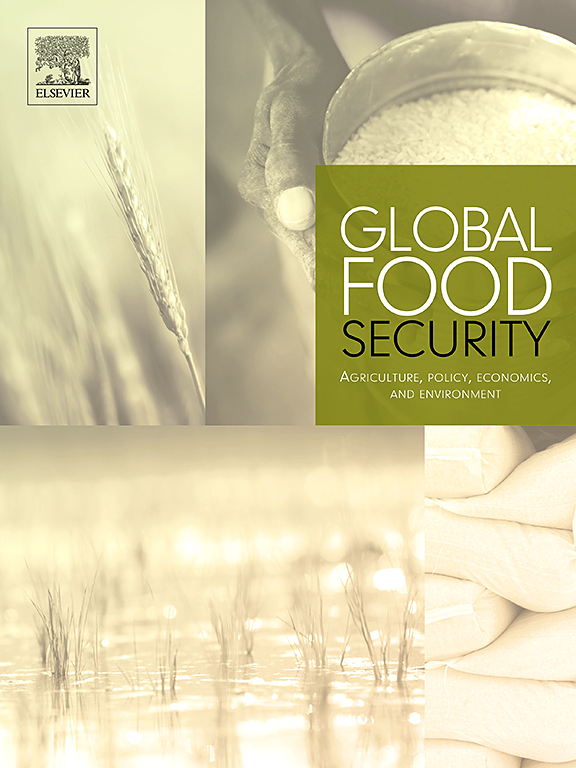Trade-offs for healthy and sustainable diets in Europe: Social-ecological dynamics in an intensive agricultural system
IF 9.6
1区 经济学
Q1 FOOD SCIENCE & TECHNOLOGY
Global Food Security-Agriculture Policy Economics and Environment
Pub Date : 2025-02-11
DOI:10.1016/j.gfs.2025.100829
引用次数: 0
Abstract
Food production and trade are key drivers of environmental change worldwide. Global initiatives emphasize the need to shift towards healthier and more sustainable diets, with increased consumption of fruits and vegetables (F&V). However, F&V cultivation relies on diverse high-value crop species that often require intensive fertilization and irrigation for optimum yield and quality, as well as a large labor force. This generates trade-offs across scales between the impacts in the production regions and the global need to increase F&V production. Through multi-actor dialogues, we analysed the social-ecological dynamics of the F&V agriculture system in Southeast Spain, which crucially supplies F&V to Northern Europe. Using a new approach combining the 3Horizons method and system thinking tools, our results reveal the agricultural system's context-specific structures as a foundation for exploring transformative opportunities. We found that the agricultural system a) is sustained in a governance model that lacks cooperation and fosters polarized views, 2) surpasses the biophysical limits, and 3) relies on immigrant low-wage labor. Additionally, our results underscore the need to share the responsibilities and costs of the food-system transformation across the supply chain actors, focusing on the potential of retailers, governance institutions at multiple scales, collective structures of farmer producers, and auxiliary industries to support sustainable and just transformative changes.
欧洲健康和可持续饮食的权衡:集约化农业系统中的社会生态动态
粮食生产和贸易是全球环境变化的主要驱动因素。全球倡议强调有必要转向更健康和更可持续的饮食,增加水果和蔬菜的消费(食品和蔬菜)。然而,粮食作物种植依赖于多种高价值作物品种,往往需要密集施肥和灌溉才能获得最佳产量和质量,而且需要大量劳动力。这就需要在生产区域的影响和全球增加粮食产量的需求之间进行权衡。通过多方对话,我们分析了西班牙东南部粮食农业系统的社会生态动态,该系统主要向北欧供应粮食。通过结合3Horizons方法和系统思维工具的新方法,我们的研究结果揭示了农业系统的特定环境结构是探索变革机会的基础。我们发现农业系统a)维持在一个缺乏合作和促进观点两极分化的治理模式中,2)超越了生物物理极限,3)依赖移民的低工资劳动力。此外,我们的研究结果强调了在整个供应链参与者之间分担食品系统转型的责任和成本的必要性,重点关注零售商、多尺度治理机构、农民生产者集体结构和辅助产业的潜力,以支持可持续和公正的转型变革。
本文章由计算机程序翻译,如有差异,请以英文原文为准。
求助全文
约1分钟内获得全文
求助全文
来源期刊

Global Food Security-Agriculture Policy Economics and Environment
FOOD SCIENCE & TECHNOLOGY-
CiteScore
20.90
自引率
3.40%
发文量
69
期刊介绍:
Global Food Security plays a vital role in addressing food security challenges from local to global levels. To secure food systems, it emphasizes multifaceted actions considering technological, biophysical, institutional, economic, social, and political factors. The goal is to foster food systems that meet nutritional needs, preserve the environment, support livelihoods, tackle climate change, and diminish inequalities. This journal serves as a platform for researchers, policymakers, and practitioners to access and engage with recent, diverse research and perspectives on achieving sustainable food security globally. It aspires to be an internationally recognized resource presenting cutting-edge insights in an accessible manner to a broad audience.
 求助内容:
求助内容: 应助结果提醒方式:
应助结果提醒方式:


